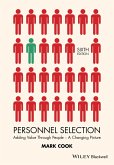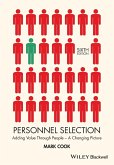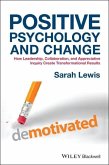An Introduction to Work and Organizational Psychology
An International Perspective
Herausgegeben:Chmiel, Nik; Fraccaroli, Franco; Sverke, Magnus
An Introduction to Work and Organizational Psychology
An International Perspective
Herausgegeben:Chmiel, Nik; Fraccaroli, Franco; Sverke, Magnus
- Broschiertes Buch
- Merkliste
- Auf die Merkliste
- Bewerten Bewerten
- Teilen
- Produkt teilen
- Produkterinnerung
- Produkterinnerung
The latest edition of this classic text provides a comprehensive and internationally relevant introduction to work and organizational psychology, exploring the depth and diversity of the field in an accessible way without obscuring the complexities of the subject.
_ Third edition of a classic textbook offering a complete introduction to work and organizational psychology for undergraduate and graduate students with no prior knowledge of the field _ An innovative new six part structure with two-colour presentation focuses the core material around issues that are either Job-Focused,…mehr
Andere Kunden interessierten sich auch für
![The Wiley Blackwell Handbook of the Psychology of Positivity and Strengths-Based Approaches at Work The Wiley Blackwell Handbook of the Psychology of Positivity and Strengths-Based Approaches at Work]() The Wiley Blackwell Handbook of the Psychology of Positivity and Strengths-Based Approaches at Work33,99 €
The Wiley Blackwell Handbook of the Psychology of Positivity and Strengths-Based Approaches at Work33,99 €![Personnel Selection Personnel Selection]() Mark CookPersonnel Selection131,99 €
Mark CookPersonnel Selection131,99 €![Personnel Selection Personnel Selection]() Mark CookPersonnel Selection51,99 €
Mark CookPersonnel Selection51,99 €![The Wiley Blackwell Handbook of the Psychology of the Internet at Work The Wiley Blackwell Handbook of the Psychology of the Internet at Work]() The Wiley Blackwell Handbook of the Psychology of the Internet at Work229,99 €
The Wiley Blackwell Handbook of the Psychology of the Internet at Work229,99 €![The Wiley Blackwell Handbook of the Psychology of Positivity and Strengths-Based Approaches at Work The Wiley Blackwell Handbook of the Psychology of Positivity and Strengths-Based Approaches at Work]() The Wiley Blackwell Handbook of the Psychology of Positivity and Strengths-Based Approaches at Work228,99 €
The Wiley Blackwell Handbook of the Psychology of Positivity and Strengths-Based Approaches at Work228,99 €![Positive Psychology and Change Positive Psychology and Change]() Sarah LewisPositive Psychology and Change41,99 €
Sarah LewisPositive Psychology and Change41,99 €![Still Moving Still Moving]() Deborah RowlandStill Moving41,99 €
Deborah RowlandStill Moving41,99 €-
-
-
The latest edition of this classic text provides a comprehensive and internationally relevant introduction to work and organizational psychology, exploring the depth and diversity of the field in an accessible way without obscuring the complexities of the subject.
_ Third edition of a classic textbook offering a complete introduction to work and organizational psychology for undergraduate and graduate students with no prior knowledge of the field
_ An innovative new six part structure with two-colour presentation focuses the core material around issues that are either Job-Focused, Organization-Focused, or People-Focused
_ Each chapter title is a question designed to engage readers in understanding work and organizational psychology whilst simultaneously inviting discussion of key topics in the field
_ The third edition introduces two new co-editors in Franco Fraccaroli from Italy and Magnus Sverke, who join Nik Chmiel and will increase relevance and appeal for European students
Hinweis: Dieser Artikel kann nur an eine deutsche Lieferadresse ausgeliefert werden.
_ Third edition of a classic textbook offering a complete introduction to work and organizational psychology for undergraduate and graduate students with no prior knowledge of the field
_ An innovative new six part structure with two-colour presentation focuses the core material around issues that are either Job-Focused, Organization-Focused, or People-Focused
_ Each chapter title is a question designed to engage readers in understanding work and organizational psychology whilst simultaneously inviting discussion of key topics in the field
_ The third edition introduces two new co-editors in Franco Fraccaroli from Italy and Magnus Sverke, who join Nik Chmiel and will increase relevance and appeal for European students
Hinweis: Dieser Artikel kann nur an eine deutsche Lieferadresse ausgeliefert werden.
Produktdetails
- Produktdetails
- Verlag: Wiley & Sons / Wiley-Blackwell
- Artikelnr. des Verlages: 1W119168020
- 3. Aufl.
- Seitenzahl: 560
- Erscheinungstermin: 26. April 2017
- Englisch
- Abmessung: 246mm x 189mm x 31mm
- Gewicht: 1238g
- ISBN-13: 9781119168027
- ISBN-10: 1119168023
- Artikelnr.: 47271789
- Herstellerkennzeichnung
- Libri GmbH
- Europaallee 1
- 36244 Bad Hersfeld
- gpsr@libri.de
- Verlag: Wiley & Sons / Wiley-Blackwell
- Artikelnr. des Verlages: 1W119168020
- 3. Aufl.
- Seitenzahl: 560
- Erscheinungstermin: 26. April 2017
- Englisch
- Abmessung: 246mm x 189mm x 31mm
- Gewicht: 1238g
- ISBN-13: 9781119168027
- ISBN-10: 1119168023
- Artikelnr.: 47271789
- Herstellerkennzeichnung
- Libri GmbH
- Europaallee 1
- 36244 Bad Hersfeld
- gpsr@libri.de
Nik Chmiel is Professor of Psychology and Head of Department, Department of Psychology & Counselling at the University of Chichester, UK. He is the past president of the European Association of Work and Organizational Psychology (EAWOP) from 2003-2007. He is on the policy committee for the British Psychological Society publication The Psychologist, and an associate editor of the European Journal of Work and Organizational Psychology. His research interests focus on psychology in the workplace, and include the psychology of safety at work, job stress and work engagement. Franco Fraccaroli is the Professor of Work & Organizational Psychology, Department of Psychology & Cognitive Science at the University of Trento, Italy. He is president of the Alliance of Organizational Psychology and past president of the European Association of Work and Organizational Psychology (EAWOP). His research interests include the older worker in organizations, meanings and social representations of work, careers in organizations, psychology of work time, and validation tools in work and organizational psychology. Magnus Sverke is Professor and Chair of the Division of Work and Organizational Psychology, Department of Psychology at the Stockholm University, Sweden. He is also Extraordinary Professor at North-West University, South Africa. His research interests include organizational change and its effects on employees, downsizing and job insecurity, labor market flexibility and employment contracts, employee attitudes and well-being, work climate and employee motivation, union member attitudes and behavior, as well as career development.
List of Contributors xi
Foreword xix
Wilmar Schaufeli
Introduction xxi
Nik Chmiel, Franco Fraccaroli and Magnus Sverke
Part I: Job-Focused 1
1. What Do People Really Do at Work? Job Analysis and Design 3
Stephen A. Woods and Daniel P. Hinton
2. How Do I Get a Job, What Are They Looking For? Personnel Selection and Assessment 25
Silvia Moscoso, Jesús F. Salgado and Neil Anderson
3. How Can I Shape My Job to Suit Me Better? Job Crafting for Sustainable Employees and Organizations 48
Pascale M. Le Blanc, Evangelia Demerouti and Arnold B. Bakker
4. What Am I Supposed to Do in My Job? Set Goals and Appraise Your People 64
Gary P. Latham
5. Why Is My Job So Stressful? Characteristics, Processes and Models of Stress at Work 80
Jan de Jonge and Christian Dormann
6. Digital Technologies at Work Are Great, Aren't They? The Development of Information and Communication Technologies (ICTs) and Their Relevance in the World of Work 102
Christian Korunka and Matti Vartiainen
7. Whose Side Is Technology On, Really? on the Interdependence of Work and Technology 121
Michael Allvin and Fredrik Movitz
8. Why Did I Choose That Career Path? Approaches to Vocational Choices and People's Readiness to Self-Manage their Own Career Paths 137
Guido Sarchielli
Part II: Organization-Focused 159
9. How Do We Get New Entrants 'On Board'? Organizational Socialization, Psychological Contracts, and Realistic Job Previews 161
Allison M. Ellis and Talya N. Bauer
10. How Does Power Affect Those Who Have It and Those Who Don't? Power Inside Organizations 176
Lourdes Munduate and Francisco J. Medina
11. Does It Matter Who Leads Us? The Study of Organizational Leadership 192
E. Kevin Kelloway and Stephanie Gilbert
12. Why Are We in a Team? Effects of Teamwork and How to Enhance Team Effectiveness 212
Annika Lantz Friedrich and Daniela Ulber
13. How Do We React When Our Organization Changes? Perspectives on Employees' Appraisal of Change, Consequences and Mitigating Factors 233
Magnus Sverke, Helena Falkenberg, Johnny Hellgren, Chang-qin Lu and Jaco Pienaar
14. How Do We Feel and Behave When We're Not Permanent Full-Time Employees? The Case of the Diverse Forms of Non-Standard Work 258
Claudia Bernhard-Oettel, Nele De Cuyper, Megan Murphy and Catherine E. Connelly
15. Why Should Organizations Treat their Employees Fairly? Definition, Relevance, and Consequences of Justice at Work 276
Constanze Eib and Guillaume Soenen
16. What Does Our Organization Do to Help Our Well-Being? Creating Healthy Workplaces and Workers 295
Arla Day and Karina Nielsen
Part III: People-Focused 315
17. Does It Matter Who We Are? Personality at Work 317
Adrian Furnham
18. How Do I Learn What to Do? How the Science of Training Supports Learning 335
Amanda Woods, Julie Dinh and Eduardo Salas
19. How Much Effort Will I Put into My Work? It Depends on Your Type of Motivation 354
Anja Van den Broeck, Joseph Carpini, Hannes Leroy and James M. Diefendorff
20. How Do We Handle Computer-Based Technology? What Is the Cost/Benefit Ratio of Technology for Workers? 373
Fred R. H. Zijlstra and Anne-Sophie Nyssen
21. Why Do I Put Myself and Others in Danger or Help Increase Safety? Person- and Situation-Related Causes of Safety Behaviours 388
Nik Chmiel and Gudela Grote
22. Does It Matter Whether I Am a Happy and Committed Worker? The Role of Identification, Commitment and Job Satisfaction for Employee Behaviour 410
Rolf van Dick and Lucas Monzani
23. How Does Work Fit with My Life? The Relation Between Flexible Work Arrangements, Work-Life Balance and Recovery from Work 430
Gör
Foreword xix
Wilmar Schaufeli
Introduction xxi
Nik Chmiel, Franco Fraccaroli and Magnus Sverke
Part I: Job-Focused 1
1. What Do People Really Do at Work? Job Analysis and Design 3
Stephen A. Woods and Daniel P. Hinton
2. How Do I Get a Job, What Are They Looking For? Personnel Selection and Assessment 25
Silvia Moscoso, Jesús F. Salgado and Neil Anderson
3. How Can I Shape My Job to Suit Me Better? Job Crafting for Sustainable Employees and Organizations 48
Pascale M. Le Blanc, Evangelia Demerouti and Arnold B. Bakker
4. What Am I Supposed to Do in My Job? Set Goals and Appraise Your People 64
Gary P. Latham
5. Why Is My Job So Stressful? Characteristics, Processes and Models of Stress at Work 80
Jan de Jonge and Christian Dormann
6. Digital Technologies at Work Are Great, Aren't They? The Development of Information and Communication Technologies (ICTs) and Their Relevance in the World of Work 102
Christian Korunka and Matti Vartiainen
7. Whose Side Is Technology On, Really? on the Interdependence of Work and Technology 121
Michael Allvin and Fredrik Movitz
8. Why Did I Choose That Career Path? Approaches to Vocational Choices and People's Readiness to Self-Manage their Own Career Paths 137
Guido Sarchielli
Part II: Organization-Focused 159
9. How Do We Get New Entrants 'On Board'? Organizational Socialization, Psychological Contracts, and Realistic Job Previews 161
Allison M. Ellis and Talya N. Bauer
10. How Does Power Affect Those Who Have It and Those Who Don't? Power Inside Organizations 176
Lourdes Munduate and Francisco J. Medina
11. Does It Matter Who Leads Us? The Study of Organizational Leadership 192
E. Kevin Kelloway and Stephanie Gilbert
12. Why Are We in a Team? Effects of Teamwork and How to Enhance Team Effectiveness 212
Annika Lantz Friedrich and Daniela Ulber
13. How Do We React When Our Organization Changes? Perspectives on Employees' Appraisal of Change, Consequences and Mitigating Factors 233
Magnus Sverke, Helena Falkenberg, Johnny Hellgren, Chang-qin Lu and Jaco Pienaar
14. How Do We Feel and Behave When We're Not Permanent Full-Time Employees? The Case of the Diverse Forms of Non-Standard Work 258
Claudia Bernhard-Oettel, Nele De Cuyper, Megan Murphy and Catherine E. Connelly
15. Why Should Organizations Treat their Employees Fairly? Definition, Relevance, and Consequences of Justice at Work 276
Constanze Eib and Guillaume Soenen
16. What Does Our Organization Do to Help Our Well-Being? Creating Healthy Workplaces and Workers 295
Arla Day and Karina Nielsen
Part III: People-Focused 315
17. Does It Matter Who We Are? Personality at Work 317
Adrian Furnham
18. How Do I Learn What to Do? How the Science of Training Supports Learning 335
Amanda Woods, Julie Dinh and Eduardo Salas
19. How Much Effort Will I Put into My Work? It Depends on Your Type of Motivation 354
Anja Van den Broeck, Joseph Carpini, Hannes Leroy and James M. Diefendorff
20. How Do We Handle Computer-Based Technology? What Is the Cost/Benefit Ratio of Technology for Workers? 373
Fred R. H. Zijlstra and Anne-Sophie Nyssen
21. Why Do I Put Myself and Others in Danger or Help Increase Safety? Person- and Situation-Related Causes of Safety Behaviours 388
Nik Chmiel and Gudela Grote
22. Does It Matter Whether I Am a Happy and Committed Worker? The Role of Identification, Commitment and Job Satisfaction for Employee Behaviour 410
Rolf van Dick and Lucas Monzani
23. How Does Work Fit with My Life? The Relation Between Flexible Work Arrangements, Work-Life Balance and Recovery from Work 430
Gör
List of Contributors xi
Foreword xix
Wilmar Schaufeli
Introduction xxi
Nik Chmiel, Franco Fraccaroli and Magnus Sverke
Part I: Job-Focused 1
1. What Do People Really Do at Work? Job Analysis and Design 3
Stephen A. Woods and Daniel P. Hinton
2. How Do I Get a Job, What Are They Looking For? Personnel Selection and Assessment 25
Silvia Moscoso, Jesús F. Salgado and Neil Anderson
3. How Can I Shape My Job to Suit Me Better? Job Crafting for Sustainable Employees and Organizations 48
Pascale M. Le Blanc, Evangelia Demerouti and Arnold B. Bakker
4. What Am I Supposed to Do in My Job? Set Goals and Appraise Your People 64
Gary P. Latham
5. Why Is My Job So Stressful? Characteristics, Processes and Models of Stress at Work 80
Jan de Jonge and Christian Dormann
6. Digital Technologies at Work Are Great, Aren't They? The Development of Information and Communication Technologies (ICTs) and Their Relevance in the World of Work 102
Christian Korunka and Matti Vartiainen
7. Whose Side Is Technology On, Really? on the Interdependence of Work and Technology 121
Michael Allvin and Fredrik Movitz
8. Why Did I Choose That Career Path? Approaches to Vocational Choices and People's Readiness to Self-Manage their Own Career Paths 137
Guido Sarchielli
Part II: Organization-Focused 159
9. How Do We Get New Entrants 'On Board'? Organizational Socialization, Psychological Contracts, and Realistic Job Previews 161
Allison M. Ellis and Talya N. Bauer
10. How Does Power Affect Those Who Have It and Those Who Don't? Power Inside Organizations 176
Lourdes Munduate and Francisco J. Medina
11. Does It Matter Who Leads Us? The Study of Organizational Leadership 192
E. Kevin Kelloway and Stephanie Gilbert
12. Why Are We in a Team? Effects of Teamwork and How to Enhance Team Effectiveness 212
Annika Lantz Friedrich and Daniela Ulber
13. How Do We React When Our Organization Changes? Perspectives on Employees' Appraisal of Change, Consequences and Mitigating Factors 233
Magnus Sverke, Helena Falkenberg, Johnny Hellgren, Chang-qin Lu and Jaco Pienaar
14. How Do We Feel and Behave When We're Not Permanent Full-Time Employees? The Case of the Diverse Forms of Non-Standard Work 258
Claudia Bernhard-Oettel, Nele De Cuyper, Megan Murphy and Catherine E. Connelly
15. Why Should Organizations Treat their Employees Fairly? Definition, Relevance, and Consequences of Justice at Work 276
Constanze Eib and Guillaume Soenen
16. What Does Our Organization Do to Help Our Well-Being? Creating Healthy Workplaces and Workers 295
Arla Day and Karina Nielsen
Part III: People-Focused 315
17. Does It Matter Who We Are? Personality at Work 317
Adrian Furnham
18. How Do I Learn What to Do? How the Science of Training Supports Learning 335
Amanda Woods, Julie Dinh and Eduardo Salas
19. How Much Effort Will I Put into My Work? It Depends on Your Type of Motivation 354
Anja Van den Broeck, Joseph Carpini, Hannes Leroy and James M. Diefendorff
20. How Do We Handle Computer-Based Technology? What Is the Cost/Benefit Ratio of Technology for Workers? 373
Fred R. H. Zijlstra and Anne-Sophie Nyssen
21. Why Do I Put Myself and Others in Danger or Help Increase Safety? Person- and Situation-Related Causes of Safety Behaviours 388
Nik Chmiel and Gudela Grote
22. Does It Matter Whether I Am a Happy and Committed Worker? The Role of Identification, Commitment and Job Satisfaction for Employee Behaviour 410
Rolf van Dick and Lucas Monzani
23. How Does Work Fit with My Life? The Relation Between Flexible Work Arrangements, Work-Life Balance and Recovery from Work 430
Gör
Foreword xix
Wilmar Schaufeli
Introduction xxi
Nik Chmiel, Franco Fraccaroli and Magnus Sverke
Part I: Job-Focused 1
1. What Do People Really Do at Work? Job Analysis and Design 3
Stephen A. Woods and Daniel P. Hinton
2. How Do I Get a Job, What Are They Looking For? Personnel Selection and Assessment 25
Silvia Moscoso, Jesús F. Salgado and Neil Anderson
3. How Can I Shape My Job to Suit Me Better? Job Crafting for Sustainable Employees and Organizations 48
Pascale M. Le Blanc, Evangelia Demerouti and Arnold B. Bakker
4. What Am I Supposed to Do in My Job? Set Goals and Appraise Your People 64
Gary P. Latham
5. Why Is My Job So Stressful? Characteristics, Processes and Models of Stress at Work 80
Jan de Jonge and Christian Dormann
6. Digital Technologies at Work Are Great, Aren't They? The Development of Information and Communication Technologies (ICTs) and Their Relevance in the World of Work 102
Christian Korunka and Matti Vartiainen
7. Whose Side Is Technology On, Really? on the Interdependence of Work and Technology 121
Michael Allvin and Fredrik Movitz
8. Why Did I Choose That Career Path? Approaches to Vocational Choices and People's Readiness to Self-Manage their Own Career Paths 137
Guido Sarchielli
Part II: Organization-Focused 159
9. How Do We Get New Entrants 'On Board'? Organizational Socialization, Psychological Contracts, and Realistic Job Previews 161
Allison M. Ellis and Talya N. Bauer
10. How Does Power Affect Those Who Have It and Those Who Don't? Power Inside Organizations 176
Lourdes Munduate and Francisco J. Medina
11. Does It Matter Who Leads Us? The Study of Organizational Leadership 192
E. Kevin Kelloway and Stephanie Gilbert
12. Why Are We in a Team? Effects of Teamwork and How to Enhance Team Effectiveness 212
Annika Lantz Friedrich and Daniela Ulber
13. How Do We React When Our Organization Changes? Perspectives on Employees' Appraisal of Change, Consequences and Mitigating Factors 233
Magnus Sverke, Helena Falkenberg, Johnny Hellgren, Chang-qin Lu and Jaco Pienaar
14. How Do We Feel and Behave When We're Not Permanent Full-Time Employees? The Case of the Diverse Forms of Non-Standard Work 258
Claudia Bernhard-Oettel, Nele De Cuyper, Megan Murphy and Catherine E. Connelly
15. Why Should Organizations Treat their Employees Fairly? Definition, Relevance, and Consequences of Justice at Work 276
Constanze Eib and Guillaume Soenen
16. What Does Our Organization Do to Help Our Well-Being? Creating Healthy Workplaces and Workers 295
Arla Day and Karina Nielsen
Part III: People-Focused 315
17. Does It Matter Who We Are? Personality at Work 317
Adrian Furnham
18. How Do I Learn What to Do? How the Science of Training Supports Learning 335
Amanda Woods, Julie Dinh and Eduardo Salas
19. How Much Effort Will I Put into My Work? It Depends on Your Type of Motivation 354
Anja Van den Broeck, Joseph Carpini, Hannes Leroy and James M. Diefendorff
20. How Do We Handle Computer-Based Technology? What Is the Cost/Benefit Ratio of Technology for Workers? 373
Fred R. H. Zijlstra and Anne-Sophie Nyssen
21. Why Do I Put Myself and Others in Danger or Help Increase Safety? Person- and Situation-Related Causes of Safety Behaviours 388
Nik Chmiel and Gudela Grote
22. Does It Matter Whether I Am a Happy and Committed Worker? The Role of Identification, Commitment and Job Satisfaction for Employee Behaviour 410
Rolf van Dick and Lucas Monzani
23. How Does Work Fit with My Life? The Relation Between Flexible Work Arrangements, Work-Life Balance and Recovery from Work 430
Gör








